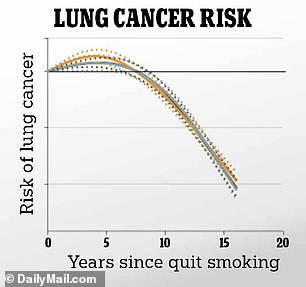Quitting smoking before age 50 offers a better chance of avoiding lung cancer than quitting after age 50, a study suggests.
Researchers in Korea studied more than 2.9 million people and found that people who quit smoking had a 17 percent lower risk of all types of cancer compared to those who did not quit.
Smoking is known to be a contributing factor to multiple cancers, including lung, stomach, colorectal, liver, pancreas, and kidney.
Cigarettes increase the risk of cancer because the poisons in cigarette smoke can weaken the body’s immune system, making it harder to kill cancer cells.
Smoking is known to be a contributing factor to multiple cancers, including lung, stomach, colorectal, liver, pancreas, and kidney.
The researchers looked at Koreans aged 30 or older who underwent two or more consecutive health checkups under the National Health Insurance Service in 2002 and were followed until 2019.
They checked whether participants had developed cancer using data from the cancer registry.
Of the 2.97 million participants, there was an average follow-up of 13.4 years, during which time 197,000 cases of cancer were confirmed.

For about seven years after quitting smoking, researchers observed an increased risk of cancer. This may be because these individuals had already accumulated substantial damage from smoking, known as “sick quitters.”
For about seven years after quitting smoking, researchers observed an increased risk of cancer.
This may be because these individuals had already accumulated substantial damage from smoking, known as “sick quitters.”
This means that they didn’t get sick because they quit smoking, but rather they quit smoking because they got sick.
Compared to those who did not quit smoking, people who quit completely had a 17 percent lower risk of cancer.
Participants’ cancer risk remained elevated for 10 years after quitting smoking, but after 15 years or more, the risk had dropped by half.
The risk of lung cancer was the first to decline, declining three years before other cancers.
Quitting smoking before age 50 was associated with a 57 percent reduction in lung cancer risk compared to quitting at age 50 or older.
Quitting smoking provided a 42 percent reduction in the risk of lung cancer, 27 percent liver cancer, 14 percent stomach cancer and 20 percent colorectal cancer compared with continuing to smoke.
The study was published in the journal Open JAMA Network.
Lung cancer is the leading cause of cancer death in the U.S. It accounts for one in five cancer deaths, followed by colorectal cancer, which causes one in 10 cancer deaths.
Approximately 238,000 new cases of lung cancer are diagnosed in the United States each year and 127,000 people die from the disease, according to the American Cancer Society.
There are two main types of lung cancer: small cell and non-small cell.
Non-small cell lung cancer is the most common type, accounting for nine out of 10 lung cancer diagnoses, and typically grows more slowly. It usually does not cause any symptoms until it has progressed.
Signs of non-small cell lung cancer, according to the NCI, include chest pain or discomfort, persistent cough, shortness of breath, wheezing, coughing up blood, loss of appetite, unintentional weight loss, fatigue or lethargy, difficulty swallowing and swelling. on the face or neck veins.
Smoking is the main cause of lung cancer.
In 2021, an estimated 11.5 percent of American adults smoked cigarettes, equal to 28.3 million people.
According to the charity Cancer Research, when smoked, cigarettes release more than 5,000 different chemicals.
These harmful chemicals enter the lungs and damage DNA.
DNA is in charge of how our cells grow and behave. DNA damage causes cells to act in ways they shouldn’t. An accumulation of DNA damage over time can lead to cancer.
Other chemicals make it difficult for cells to repair DNA damage, which can cause cancer.
A 2004 study, which followed a 50-year study of British doctors, found that if smokers quit before age 30, they can avoid more than 90 percent of the risks of lung cancer caused by smoking.
Smoking also has effects on other types of cancer; Experts believe that smoking causes at least 15 types of cancer.
It can be the cause of cancer of the mouth and throat, rectum, liver and pancreas, to name a few.

